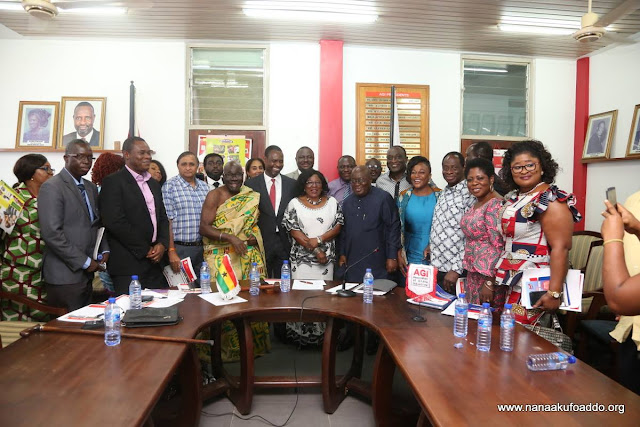The Presidential Candidate of the opposition New Patriotic Party (NPP), Nana Addo Dankwa Akufo-Addo, has reiterated his commitment to reduce the cost of doing business by reducing taxes in a move to grow industries.
Nana Addo, who met members of the Association of Ghana Industries, (AGI) on Wednesday to spell out his vision for industrialization, said his administration will create an enabling environment for business to thrive, unlike the current administration which is suffocating businesses.He presented the association with a copy of the party’s manifesto, based on which it seeks to transform the economy.
NPP to set up Industrial Development Fund – Alan
In the party’s manifesto for the 2016 elections, it announced the setting up of an Industrial Development Fund, to support critical private sector industrial initiatives, as one of the means to tackling the rising unemployment levels.Former Trade and Industry Minister, Alan Kwadwo Kyeremanten, who made this known at the party’s manifesto launch at the Accra International Trade Fair Centre in Accra, said, “the NPP will pursue aggressive industrialization based on value addition; provide tax and related incentives for manufacturing businesses; investing in skills training and apprenticeship, as well as providing resources for small businesses and start-ups to emerge and flourish.”
We’II reduce port charges and others
Mr. Kwadwo Kyeremanten also promised that an NPP government will reduce charges at the country’s ports, and other taxes, as part of moves to lessen the burden on businesses.
“To tackle the high cost of doing business, the NPP will reduce the tax burden on businesses by either completely abolishing same taxes or reducing them. By far, one of the biggest challenges industries have faced for more than five years, is inadequate supply of power. In fact, ‘dumsor’ has led to thousands of Ghanaians losing their jobs not to mention the number of families that have been affected by these considerable job losses. The NPP will implement a broad range of reforms in the energy sector to arrest the problem.”
“Ghanaian businesses face significant challenges in exporting or importing goods at the ports. To address these challenges, the NPP will significantly reduce fees and charges at the Ports. We will also introduce reforms in Port clearing systems and benchmark our ports against some of the best in the world such as Dubai and Singapore, and make our ports some of the most efficient in Africa to support import and export.
Establishment of industrial zones
Mr. Kyeremanten announced the creation of industrial zones across the country.
“Industrial activity in Ghana has also been constrained by poor industrial development planning including limited access to land for the development of industrial zones. To address this challenge, the NPP will facilitate access to dedicated land spaces in every region for the establishment of multi-purpose industrial parks. We will also develop vibrant commercial zones in border towns in Ghana, and work jointly with our neighbouring countries on developing industrial activities, which will create jobs and promote efforts towards stronger economic integration in the ECOWAS region.”
‘A new golden age for small businesses’
According to Mr. Kyeremanten, in order “To promote entrepreneurship, the NPP will usher in a new golden age for small businesses by launching a comprehensive national plan for entrepreneurship and innovation that will invest in supporting existing small businesses and high growth potential as well as start-ups particularly those initiated by young persons.”
Apprenticeship and skills development centres
The former Trade and Industry Minister also mentioned that an NPP government will set up an apprenticeship and skills development centres to train skilled labour force for specific industrial sectors.
“Skills shortage for industrial development is one of the critical areas that the NPP will urgently address. In this regard, we will establish an apprenticeship and skills development centres to train skilled labour force for specific industrial sectors.
Secondly, we will develop in collaboration with Trade Unions a database for trained apprentices and artisans, and establish a national apprentice recruitment agency. In partnership with the private sector, we will transform the existing apprenticeship training module from a supply driven approach, to a market driven model based on the German apprenticeship model.”
–












